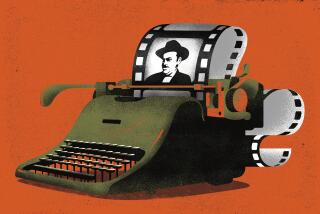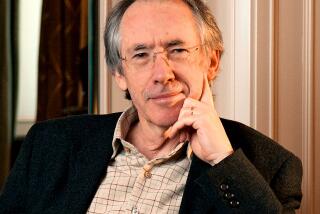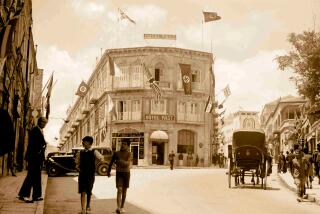Book Review : The Transformation of Pain Into Art
W or the Memory of Childhood by Georges Perec; Translated by David Bellos (David R. Godine: $16.95; 164 pages)
There are events so terrible that art is too glib to render them, and memory so traumatized as to become inarticulate.
The Holocaust is one, probably the chief, of these. In the end, it defies artistic transformation. Primo Levi comes closest. His writings flame miraculously atop it, but it remains irreducible and unconsumed. And even the most detailed eyewitness testimony leaves it impossible to grasp.
Georges Perec, the most remarkable of France’s postwar novelists, found not an answer to the impasse but another way of posing it. Author of “Life: A User’s Manual,” Perec is a true heir both of Franz Kafka and the gracefully paradoxical Raymond Queneau. The product of this only apparently improbable union is desolation by dirigible; a terrifically complicated lighter-than-air device for transporting sorrow.
Hidden by Catholics
Perec’s parents were Polish Jews living in France. His father joined the army and was killed by a shell a day after the 1940 armistice. His mother was rounded up along with other Jews and died en route to a concentration camp. Perec was spirited off by the Red Cross to a country town and hidden in a Catholic school. There he was baptized and instructed as a Catholic. It was for his protection, but it also left his childhood, his memories and his sense of himself under a sign of schism.
“W” is Perec’s means of confronting the evil that history committed upon him, and the schism that it opened up. It is itself divided in two parts; one reflecting the need to understand, the other the need to recall. Art and memory, respectively.
Two narrations are set out, in alternating chapters. The first is an elegant, chilling and masterful parable upon the Nazi concentration camps. The other is Perec’s fragmented, deliberately uninflected and necessarily random memories of a childhood that knew nothing of the camps but was so terribly shaped by them.
The parable is a mock-Utopia that disintegrates before our eyes. Perec invents an island--W--off Tierra del Fuego, where a society dedicated entirely to Olympic sports has been set up.
Cheerful Invention
The early passages describe a cheerful if cuckoo way of life. The island is divided into four villages, inhabited entirely by athletes. They practice most of the Olympic sports in a series of endless competitions that begin within each village, ascend to inter-village meets and culminate with three kinds of all-island events.
So far, so good, despite some suspect oddities. Competition is incessant; women are kept apart and do not compete; and there is no pole-vault. Only later, does the lack of this event--with its moment of free flight at the top of the lunge--become significant.
Bit by bit, evil seeps in. The winners are gorged to satiety each night; the losers are starved. Later, we learn that they are jeered and beaten; and still later, that some are killed.
The victors, apparently, are the privileged. Then we learn how fragile and arbitrary their privilege is. The judges may proclaim the last man in a race to be the winner. Or, in a 400-meter race, they will make some competitors do 440 meters, while others do 380.
Not only are the competitions corrupted, but one of them consists of mass rape. The women are brought out and made to run; the athletes pursue them. There are more athletes than women; the would-be starters gouge, disable and murder each other to improve their chances.
It is, in short, a life that turns men into beasts, manipulated by faceless officials--judges, managers, trainers--who remain aloof and untouchable. It is Perec’s brilliantly told model of Nazism and its camps.
Toward the end, the narrator notes that, considering the sufferings of the athletes, “it should come as no great surprise that the performances put up are utterly mediocre: the 100 meters is run in 23.4 seconds, the 200 meters in 51 seconds; the best high jumper has never exceeded 1.30 meters.”
In a flash, the horror becomes absurd; the microcosm of supermen becomes a microcosm of dwarves. Evil is banal.
More to Read
Sign up for our Book Club newsletter
Get the latest news, events and more from the Los Angeles Times Book Club, and help us get L.A. reading and talking.
You may occasionally receive promotional content from the Los Angeles Times.






